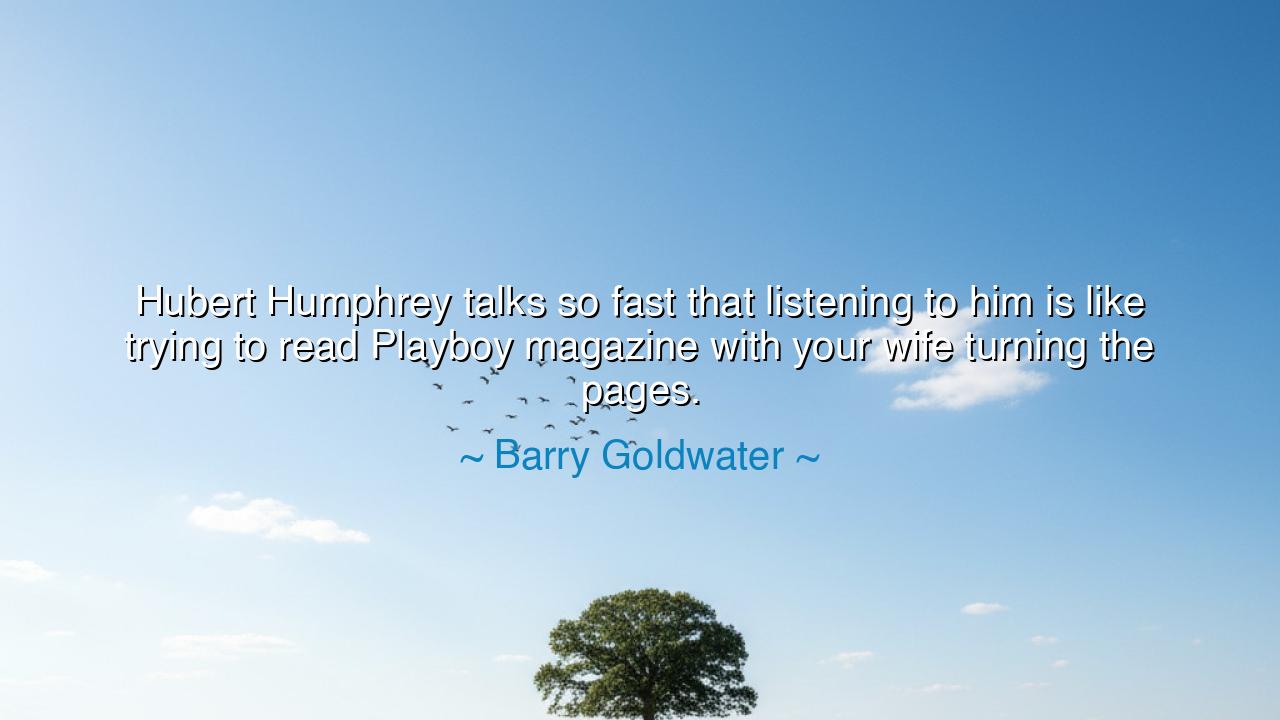
Hubert Humphrey talks so fast that listening to him is like
Hubert Humphrey talks so fast that listening to him is like trying to read Playboy magazine with your wife turning the pages.






“Hubert Humphrey talks so fast that listening to him is like trying to read Playboy magazine with your wife turning the pages.” — Barry Goldwater
Thus spoke Barry Goldwater, the fierce lion of American conservatism, about his political rival Hubert Humphrey, a man of ceaseless energy and boundless words. Though the quote is wrapped in wit and laughter, beneath its humor lies an insight into the nature of communication, politics, and the human spirit itself. When Goldwater likens Humphrey’s speech to “trying to read Playboy magazine with your wife turning the pages,” he paints a picture both comical and profound — the futility of grasping meaning when distraction reigns, the frustration of wanting to understand when the moment rushes by too quickly.
In the age of the ancients, philosophers understood the art of speech as sacred. Words were not thrown into the air like seeds upon barren ground; they were meant to be received, pondered, and understood. Socrates spoke slowly and questioned deeply, for he knew that truth cannot be grasped in haste. But Hubert Humphrey, as Goldwater jested, was a man whose tongue raced ahead of his meaning, whose passion overflowed faster than his listeners could follow. His speech was a torrent — dazzling, unstoppable, and, at times, exhausting. Goldwater’s humor, therefore, was not mere mockery, but recognition: that enthusiasm untempered by clarity can obscure even the noblest of intentions.
The metaphor itself, bold and irreverent, reveals the contrast between intellect and interruption. To “read Playboy with your wife turning the pages” is to attempt focus while the world around you resists it. It is the eternal struggle between attention and distraction, between the desire to understand and the forces that prevent understanding. So too, in listening to one who speaks too fast, the mind cannot rest upon any single truth — it is swept along before it can discern meaning. Goldwater, ever the man of sharp tongue and sharp mind, understood that eloquence is not speed, and that the greatest orators do not dazzle with volume, but persuade with rhythm and reason.
Yet this saying also speaks of something larger — of the balance between passion and patience. Humphrey’s flaw, if it may be called that, was born from an excess of zeal. He loved ideas, people, and progress so deeply that his words became a flood. He wanted the world to move as quickly as his mind. And in that, there is something admirable, even noble. For history’s greatest figures — from the prophets of old to the revolutionaries of modern times — have burned with such intensity that their words outpaced their breath. The danger, as Goldwater gently teased, is that such fire, if not guided, can blind rather than illuminate.
In their rivalry, Goldwater and Humphrey reflected two eternal forces: the impetuous idealist and the disciplined realist. One spoke to the heart with torrents of hope; the other to the mind with tempered strength. Theirs was not mere political opposition, but a duel of temperaments — a reminder that wisdom often lies not in what is said, but in how it is said. The ancient rhetoricians knew this truth well. They taught that the power of speech comes not from words alone, but from timing, tone, and restraint. A wise man pauses, allowing silence to give weight to his message; the unrestrained man fills every breath with noise until meaning drowns beneath sound.
The lesson is this: in speech, as in life, mastery lies in measure. Speak not so quickly that your words outpace your wisdom. Let thought guide your tongue as the rider guides his steed — firmly, but gently. For passion without patience breeds confusion, and clarity without warmth breeds indifference. The harmony of both — the balance of fire and form — is what gives rise to true understanding.
So, remember the humor of Barry Goldwater, and the vigor of Hubert Humphrey. One reminds us to laugh at excess; the other reminds us to live with fervor. Speak boldly, but listen deeply. Let your words be both swift with life and steady with wisdom. For the world does not need more noise — it needs more voices that move the heart while still giving the mind time to follow. And when you speak, do so not as one rushing to be heard, but as one crafting meaning that will endure long after the laughter fades.






AAdministratorAdministrator
Welcome, honored guests. Please leave a comment, we will respond soon